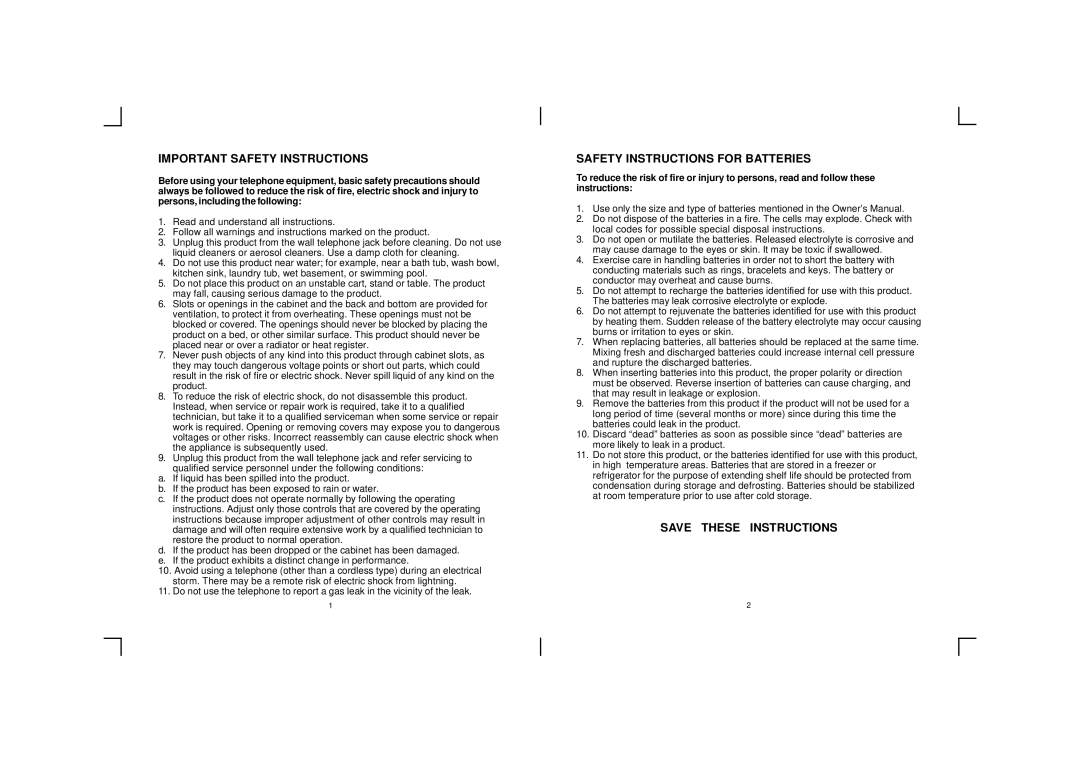
IMPORTANT SAFETY INSTRUCTIONS
Before using your telephone equipment, basic safety precautions should always be followed to reduce the risk of fire, electric shock and injury to persons, including the following:
1.Read and understand all instructions.
2.Follow all warnings and instructions marked on the product.
3.Unplug this product from the wall telephone jack before cleaning. Do not use liquid cleaners or aerosol cleaners. Use a damp cloth for cleaning.
4.Do not use this product near water; for example, near a bath tub, wash bowl, kitchen sink, laundry tub, wet basement, or swimming pool.
5.Do not place this product on an unstable cart, stand or table. The product may fall, causing serious damage to the product.
6.Slots or openings in the cabinet and the back and bottom are provided for ventilation, to protect it from overheating. These openings must not be blocked or covered. The openings should never be blocked by placing the product on a bed, or other similar surface. This product should never be placed near or over a radiator or heat register.
7.Never push objects of any kind into this product through cabinet slots, as they may touch dangerous voltage points or short out parts, which could result in the risk of fire or electric shock. Never spill liquid of any kind on the product.
8.To reduce the risk of electric shock, do not disassemble this product. Instead, when service or repair work is required, take it to a qualified technician, but take it to a qualified serviceman when some service or repair work is required. Opening or removing covers may expose you to dangerous voltages or other risks. Incorrect reassembly can cause electric shock when the appliance is subsequently used.
9.Unplug this product from the wall telephone jack and refer servicing to
qualified service personnel under the following conditions:
a.If liquid has been spilled into the product.
b.If the product has been exposed to rain or water.
c.If the product does not operate normally by following the operating instructions. Adjust only those controls that are covered by the operating instructions because improper adjustment of other controls may result in damage and will often require extensive work by a qualified technician to restore the product to normal operation.
d.If the product has been dropped or the cabinet has been damaged.
e.If the product exhibits a distinct change in performance.
10.Avoid using a telephone (other than a cordless type) during an electrical storm. There may be a remote risk of electric shock from lightning.
11.Do not use the telephone to report a gas leak in the vicinity of the leak.
1
SAFETY INSTRUCTIONS FOR BATTERIES
To reduce the risk of fire or injury to persons, read and follow these instructions:
1.Use only the size and type of batteries mentioned in the Owner’s Manual.
2.Do not dispose of the batteries in a fire. The cells may explode. Check with local codes for possible special disposal instructions.
3.Do not open or mutilate the batteries. Released electrolyte is corrosive and may cause damage to the eyes or skin. It may be toxic if swallowed.
4.Exercise care in handling batteries in order not to short the battery with conducting materials such as rings, bracelets and keys. The battery or conductor may overheat and cause burns.
5.Do not attempt to recharge the batteries identified for use with this product. The batteries may leak corrosive electrolyte or explode.
6.Do not attempt to rejuvenate the batteries identified for use with this product by heating them. Sudden release of the battery electrolyte may occur causing burns or irritation to eyes or skin.
7.When replacing batteries, all batteries should be replaced at the same time. Mixing fresh and discharged batteries could increase internal cell pressure and rupture the discharged batteries.
8.When inserting batteries into this product, the proper polarity or direction must be observed. Reverse insertion of batteries can cause charging, and that may result in leakage or explosion.
9.Remove the batteries from this product if the product will not be used for a long period of time (several months or more) since during this time the batteries could leak in the product.
10.Discard “dead” batteries as soon as possible since “dead” batteries are more likely to leak in a product.
11.Do not store this product, or the batteries identified for use with this product, in high temperature areas. Batteries that are stored in a freezer or refrigerator for the purpose of extending shelf life should be protected from condensation during storage and defrosting. Batteries should be stabilized at room temperature prior to use after cold storage.
SAVE THESE INSTRUCTIONS
2
